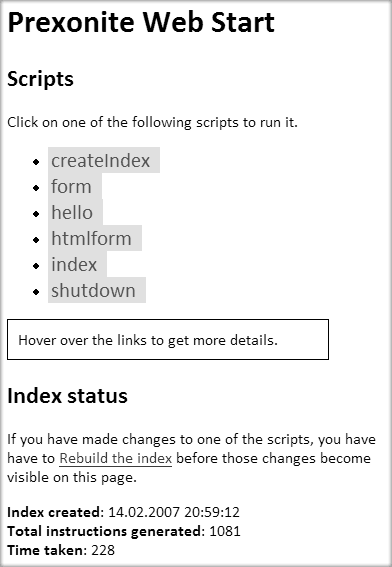Prexonite Script
a .NET hosted scripting language with a focus on meta-programming and embedded DSLs
Prexonite as a web scripting language
Like many other developers my age, I had my first programming experiences with PHP and scripting websites. From time to time, I'm drawn back to that world. This time, I built a proof-of-concept-quality infrastructure for using Prexonite Script as a web scripting language.
The Host
I built an HTTP application server (using the HttpListener) in C# that hosts the Prexonite Scripting Engine.
An apache webserver is used to forwards all requests to files that end in ".pxs" (using mod_rewrite and mod_proxy) to that app server.
The Prexonite host then compiles the requested file, executes it's main function and returns the output produced by the script to the web server/user.
Capturing the output is done by replacing the standard print and println commands with custom ones that print to the response stream.
Additional commands provide access to GET, POST and cookie data.
To make access to those parameters easier, I also created corresponding classes. They all implement the IObject interface to intercept object member calls from the script. This not only bypasses the (usually) slower late binding but also allows me to add some syntactic sugar*.
The Script
Prexonite web scripts work exactly like the ones for Prx.exe, except that they have access to a couple of additional commands.
function main does println("Hello World");I haven't written that many web scripts so far. One of them compiles all other scripts it finds, extracts their meta information and generates some sort of meta data index file.
This file is then used by another script to display a "table of contents" with descriptions, extracted from the individual files.
Web Scripts
I was writing about syntactic sugar earlier. Here is what I meant:
//... taken out of a page that displays a form
and expects the user to enter his/her name,
so it could welcome him/her.
if(Post.name != "")
//Post.IsDefined("name") is an alternative
{
print("Hello, " + Post.name +
"!
\nBack");
}
else
{
//Uses funcitons defined in a different file.
declare function form_begin, form_textfield, form_end;
//Display form
form_begin("Enter your name:", "htmlform.pxs");
form_textfield("Name","name");
form_end();
}The supplied POST variable is accessible through the Post command. Wait... commands that allow for object member calls? No, the commands return an object that interprets calls to non-existant members as parameter names. This is possible by implementing the IObject interface in a type that is not already handled by a native Prexonite Type.
